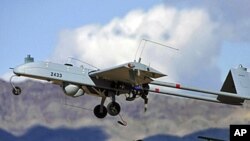Pakistani authorities are demanding that the number of CIA operatives inside their country be reduced significantly and that U.S. drone attacks in the border regions near Afghanistan also be halted.
With high level meetings between the head of Pakistan’s intelligence agency, the ISI, and the head of the U.S. Central Intelligence Agency taking place in Washington, there have been reports that Pakistani authorities are asking the United States to drastically reduce its presence here.
U.S. media reports quote Pakistani officials who say they want the United States to cut its CIA personnel in the country by an estimated 25 to 40 percent.
Relations between the two countries have been frayed since a CIA contractor shot dead two Pakistani men in the city of Lahore earlier this year. The U.S. said Raymond Davis had diplomatic immunity and acted in self-defense. He was released after victims' families accepted compensation.
The case stirred anti-American sentiment in Pakistan, where the public is already opposed to U.S. drone strikes against militants in Pakistan's tribal region.
The U.S. would also like to see more aggressive action against Taliban and al-Qaida-linked militants in the border region between Afghanistan and Pakistan. This assessment was outlined in a recent White House report to Congress that angered many in Pakistan.
Still, according to noted Pakistani analyst Hassan Askari, this current round of tensions will not result in a collapse of the alliance.
"The are trying to re-articulate their relationship, because despite the differences which they have, they need to cooperate with each other,." Askari said. "They recognize they will have to cooperate with each other to deal with terrorism and Afghanistan problems."
A CIA spokesman said Monday's talks between ISI chief Ahmed Shuja Pasha and CIA head Leon Panetta were frank and productive and that the relationship between the two countries' intelligence services remains "on solid footing."
But there is also growing anti-American sentiment on the streets of Pakistan.
The ongoing attacks by drones, the CIA activity and the war in Afghanistan all have contributed to a strong outcry by many here against any cooperation between Pakistan and the United States.
According to Askari, the resentment translates to recruitment into extremist groups. He says any disagreements between the two countries should perhaps be handled more privately.
"Any report coming from the U.S. criticizing Pakistani government gives a kind of handle to the Islamic political parties, to militants, to anyone who is anti-American to do propaganda in Pakistan," he said. "Therefore if the U.S. and Pakistan can deal with their problems discreetly rather than publicly, I think that would be a better approach."
For now, however, the disagreements are public and the relationship is far from the friendliest it’s been. And that could affect both ongoing anti-terrorism efforts and the war in Afghanistan.
Related video report by Carolyn Presutti:




